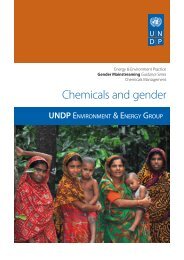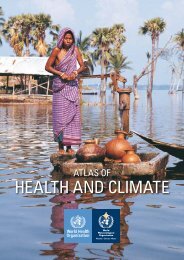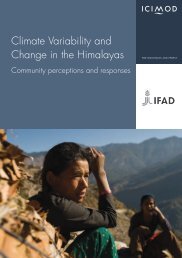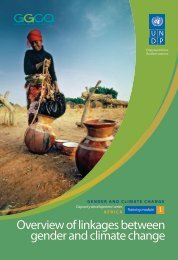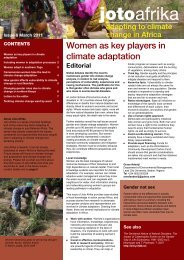Module 4: Gender, Agriculture and Food Security - Gender Climate
Module 4: Gender, Agriculture and Food Security - Gender Climate
Module 4: Gender, Agriculture and Food Security - Gender Climate
- No tags were found...
You also want an ePaper? Increase the reach of your titles
YUMPU automatically turns print PDFs into web optimized ePapers that Google loves.
Case study 3<br />
<strong>Gender</strong>, international finance institutions<br />
<strong>and</strong> food security (Ethiopia)<br />
Source: Extracted from Arend, E. 2011.<br />
“Poor, rural Ethiopians, the majority of whom are women <strong>and</strong> girls, experience chronic<br />
food insecurity. Despite decades of agricultural investments from international finance<br />
institutions (IFIs), overall productivity in Ethiopia’s agriculture sector has stagnated,<br />
leaving 8.3 million Ethiopians more or less perennially dependent on food security<br />
programs, <strong>and</strong> several million more [who] are susceptible to food insufficiency in<br />
the event of adverse climatic shocks (World Bank, 2008). Although the World Bank<br />
(WB) has invested a total of $2.5 billion in agriculture <strong>and</strong> food security projects in<br />
Ethiopia since 1970, a 2010 WB project appraisal stated that the capacity of [Ethiopia’s]<br />
agricultural institutions is still weak, […] yields remain low, <strong>and</strong> many geographical<br />
areas have unexploited potential for productivity growth. The WB noted that<br />
Ethiopia’s poor have also suffered disproportionately from the global economic crisis,<br />
as the price of goods consumed by the poor is estimated to have risen by 78 percent<br />
in urban areas <strong>and</strong> 85 percent in rural areas between 2008-2010 (2010). Households<br />
are often forced to fulfil basic food needs by selling assets, reducing the number of<br />
meals eaten per day, or borrowing food or money (FAO, 2009). Ethiopian women <strong>and</strong><br />
girls bear the greatest burdens due to food insecurity, since they have a substantive<br />
productive role in the rural sector, including participation in livestock maintenance <strong>and</strong><br />
management, crop production <strong>and</strong> marketing of rural produce (Ethiopian Ministry of<br />
Foreign Affairs, 2010).<br />
This case study applies <strong>Gender</strong> Action’s Essential <strong>Gender</strong> Analysis Checklist to four<br />
active IFI projects in Ethiopia that focus on agriculture, l<strong>and</strong> management <strong>and</strong><br />
nutrition. Totalling $384 million <strong>and</strong> funded by the WB, none of these projects<br />
embrace a gender rights perspective or analyse differential impacts on men <strong>and</strong><br />
women, boys <strong>and</strong> girls; <strong>and</strong> only two out the four projects discuss gender equality.<br />
The WB’s private sector arm, the International Finance Corporation (IFC), also<br />
invests in Ethiopia: in 2010, the IFC extended a ‘risk-sharing facility’ worth up to<br />
<strong>Gender</strong> <strong>and</strong> <strong>Climate</strong> Change Capacity development series Afric a<br />
<strong>Gender</strong>, agriculture <strong>and</strong> food security Training module 4<br />
23



